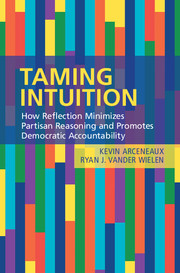
-
Select format
-
- Publisher:
- Cambridge University Press
- Publication date:
- 30 August 2017
- 11 August 2017
- ISBN:
- 9781108227643
- 9781108415101
- 9781108400312
- Dimensions:
- (228 x 152 mm)
- Weight & Pages:
- 0.5kg, 260 Pages
- Dimensions:
- (228 x 152 mm)
- Weight & Pages:
- 0.4kg, 260 Pages
You may already have access via personal or institutional login
Book description
The success of democratic governance hinges on an electorate's ability to reward elected officials who act faithfully and punish those who do not. Yet there is considerable variation among voters in their ability to objectively evaluate representatives' performance. In this book the authors develop a theoretical model, the Intuitionist Model of Political Reasoning, which posits that this variation across voters is the result of individual differences in the predisposition to reflect on and to override partisan impulses. Individuals differ in partisan intuitions resulting from the strength of their attachments to parties, as well as the degree to which they are willing to engage in the cognitively taxing process of evaluating those intuitions. The balance of these forces - the strength of intuitions and the willingness to second guess one's self - determines the extent to which individuals update their assessments of political parties and elected officials in a rational manner.
Awards
Winner, 2018 Robert E. Lane Best Book Award, Political Psychology, American Political Science Association
Co-winner, 2018 Best Book Award, Experimental Research Section, American Political Science Association
Reviews
'Arceneaux and Vander Wielen’s book is transformative as it explores a question that has been ignored when it comes to democratic citizenship: what happens when citizens reflect? They develop an impressive theory and use state-of-the-art methods to show that reflection fundamentally alters how citizens reason and make decisions. The book not only alters common understandings of citizens’ behaviors, but also sets an agenda for the future of all research on democratic citizenship.'
James N. Druckman - Payson S. Wild Professor of Political Science, Northwestern University
'In this remarkable book, Arceneaux and Vander Wielen apply dual-process models of how people think to questions of how they reason about politics. They develop and refine a powerful conceptual model and then provide insightful, innovative empirical tests. I have long been looking for a book like this one that integrates recent insights about human cognition with long-standing questions about how voters think. This ambitious, thought-provoking research should be read by anyone who wants to understand the role of intuition and reflection in voter decision-making.'
Daniel Hopkins - University of Pennsylvania
'This book takes on one of the most important political questions of our time. Its central argument, and the evidence presented in support of it, is exciting and provocative. To date, no one has figured out how to reduce the myriad information-processing biases identified by Motivated Reasoning Theory that produce the polarization and lack of compromise plaguing our current politics. Unfortunately, giving people new and credible information in particular, and even education in general, often exacerbates these biases. The more subtle answer offered by Arceneaux and Vander Wielen is that those with the ability to coolly reflect on controversial topics can avoid making these common mistakes. Now if we can only figure out how to train people to hold such a rare combination of curiosity and cool-headedness! Taming Intuition will, at the very least, be an important voice in an important debate.'
Nicholas Valentino - University of Michigan
Contents
Metrics
Altmetric attention score
Full text views
Full text views help Loading metrics...
Loading metrics...
* Views captured on Cambridge Core between #date#. This data will be updated every 24 hours.
Usage data cannot currently be displayed.
Accessibility standard: Unknown
Why this information is here
This section outlines the accessibility features of this content - including support for screen readers, full keyboard navigation and high-contrast display options. This may not be relevant for you.
Accessibility Information
Accessibility compliance for the PDF of this book is currently unknown and may be updated in the future.


